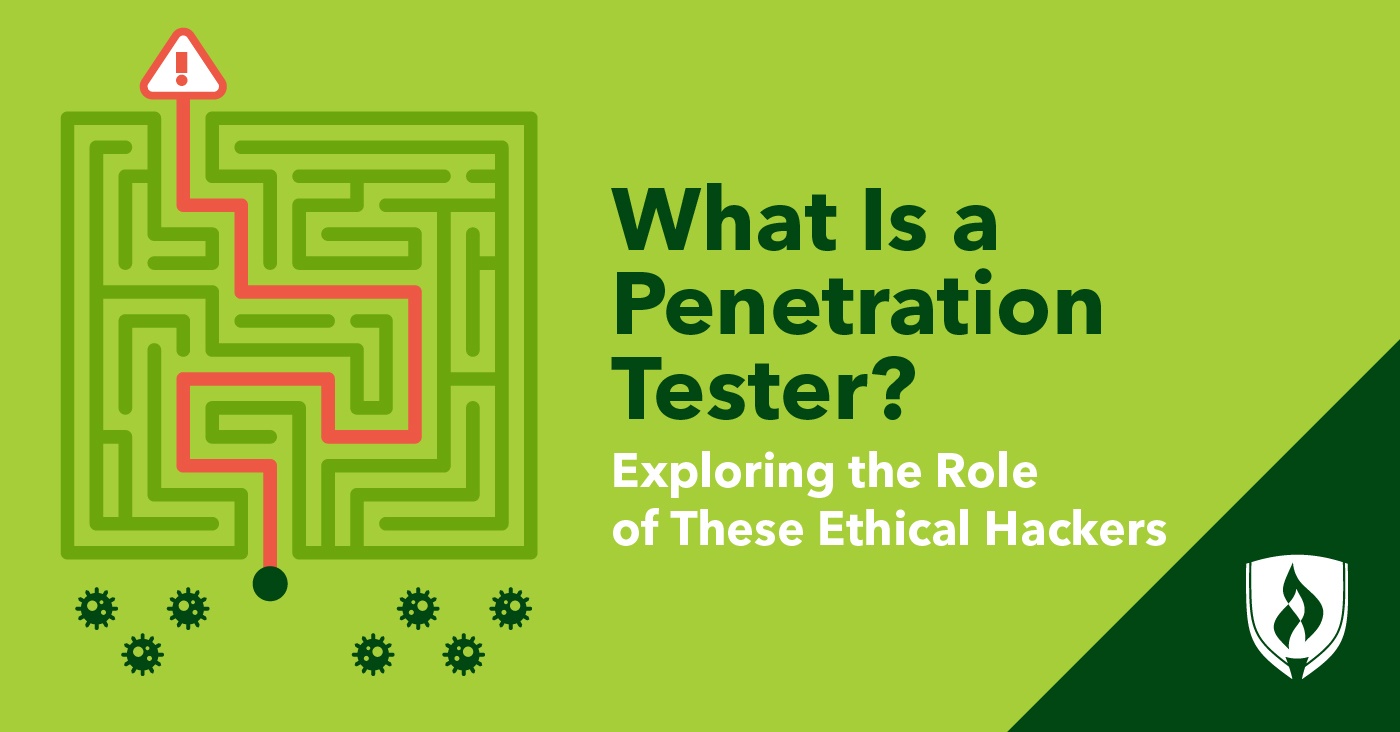What Is a Penetration Tester? Exploring the Role of These Ethical Hackers
By Ashley Brooks on 05/03/2021

Cybersecurity is a hot career field these days. With the average number of security breaches up by 67 percent, and the average monetary cost of these attacks up by 72 percent in the last five years, it’s no surprise that individuals, corporations and governments alike are clamoring to hire cybersecurity professionals.1
You’re intrigued by the field of cybersecurity, but many of the job titles remain a mystery to you. Successful cybersecurity teams have different roles that work together to protect data and prevent security breaches. Penetration testers are one of them.
What is a penetration tester? These “reverse hackers” are an integral part of any robust cybersecurity system—and you could be one of them.
But first, you need to know more about what the job entails, including daily responsibilities, work environment and, of course, salary potential. Read on to learn more about this exciting tech career so you can decide if it’s the right option for you.
What is penetration testing?
Penetration testing is the official name for “good” hacking—in other words, identifying security gaps that could lead to cybersecurity attacks before malicious hackers find them. It also goes by the names “white hat hacking” or “ethical hacking.”
“Penetration testers help organizations identify security gaps and vulnerabilities in their IT infrastructures,” says Andre Ross, certified ethical hacker and penetration testing specialist at Elvidence Forensic Investigations. Ross likens ethical hackers’ work to doctors who take the oath to do no harm. “All white hat hackers use the same principle, and this is what differs them from malicious hackers.”
Penetration testing is valuable for any company with digital data to protect—which is just about all companies in the digital age. Financial and medical institutions, which both store highly sensitive data, are often the keenest to use penetration testing to protect themselves from breaches, but organizations in any industry can benefit from this tech service.
It’s important to note that penetration testing isn’t the same as vulnerability testing. “Vulnerability testers are looking for the flaws in the system during the design process, and penetration testers do it in existing and functioning systems,” says Nebojsa Calic, founder of CyberCrew.
What does a penetration tester do?
So does that mean penetration testers sit around hacking networks at random and getting paid for it? Not exactly.
Calic shares that most penetration testing begins with a team meeting to agree on a strategy and work assignments for the current project. Next, they’ll move onto the actual assessments. “Some responsibilities include planning and designing penetration tests to pinpoint the weaknesses in the best way, conducting tests, creating reports and advising on security improvements,” Calic says.
There also might be more paperwork than you’d expect in this tech career, such as signing nondisclosure agreements with clients. One of the most important parts of a penetration tester’s contract is called the rules of engagement. “Rules of engagement (RoE) is the primary document dealing with how the penetration test is conducted,” Ross says. “One step outside the RoE, and you may find yourself financially liable for damages caused during the pentest.”
What’s the job and salary outlook for a penetration tester?
Job stability and salary potential are always considerations when you’re exploring a new career path. Thanks to an increase in the number of cyberattacks—not to mention hackers becoming more creative in their methods—cybersecurity positions are in high demand.
The Bureau of Labor Statistics (BLS) doesn’t have data specific to penetration testers, but employment of the closely related occupation of information security analyst is projected to grow 31 percent through 2029!2
What are the qualities of a successful penetration tester?
Maybe you’re thinking penetration testing sounds like a strong contender for your future career, but you’re not sure if you have what it takes to make it in the field. Aside from technical skills that can be taught in a degree program, there are a few qualities that many penetration testers share.
Sense of curiosity, and an eagerness to learn. Technology doesn’t stay the same for long. Hackers are continuously updating their bags of tricks to find new ways to accomplish data breaches, which means penetration testers need to stay on their toes. “A good penetration tester is a person who's curious about how things work and constantly learns new things in order to hack the system and be one step ahead of hackers,” Calic says.
Strong communication skills. Penetration testers will have an easier time accomplishing their goals if they’re skilled at making sure everyone on their team is on the same page. They also need to clearly communicate with clients, which can be tricky. “They need to be able to explain what's wrong to people who are not in the industry and don't understand their technical language,” Calic says.
Detail-oriented problem-solvers. Sure, some systems might have glaring vulnerabilities that are easy to find. But to think like a hacker, penetration testers need a keen eye for detail so they can spot problems that aren’t easy to see. Once they’ve identified a gap in security, they need the problem-solving skills to fix it.
How do you become a penetration tester?
If you’re intrigued by everything you’ve read so far, you’re probably wondering how you can join the ranks of these cybersecurity professionals!
Most penetration testers and information security analysts are required to have a Bachelor’s degree in a computer-related program, such as Computer Science or Cybersecurity. It’s also a good idea to pursue certification in this career field. Although this step is optional, it can give employers and clients extra peace of mind to know that their penetration tester has the proper experience and training.
One option is the Certified Ethical Hacker certification offered by the EC-Council (International Council of Electronic Commerce Consultants). Candidates are eligible to sit for the exam once they have two years of related experience under their belts. Another is the Certified Penetration Tester, offered by the Information Assurance Certification Review Board (IACRB). More advanced certifications are also available once you’re ready to level up your ethical hacking skills.
Could you be the next ethical hacker?
What is a penetration tester? These ethical hackers work tirelessly to prevent cyberattacks before they happen. With cybercrimes on the rise and information security careers in high demand, you could be next to join their ranks.
You might be wondering if a degree program is really necessary to enter this field. You don’t want to waste any time getting started if you could just learn on your own! See our article “Is a Cyber Security Degree Worth It? The Facts You Can’t Ignore” to find out!
Related Articles:
1“The Cost of Cybercrime: The Ninth Annual Cybercrime Study,” [accessed February 2021], https://www.accenture.com/_acnmedia/PDF-96/Accenture-2019-Cost-of-Cybercrime-Study-Final.pdf#zoom=50
2 Bureau of Labor Statistics, Occupational Outlook Handbook, [information accessed February 2021] https://www.bls.gov/ooh/computer-and-information-technology/information-security-analysts.htm#tab-1. Information represents national, averaged data for the occupations listed and includes workers at all levels of education and experience. This data does not represent starting salaries, and employment conditions in your area may vary.




